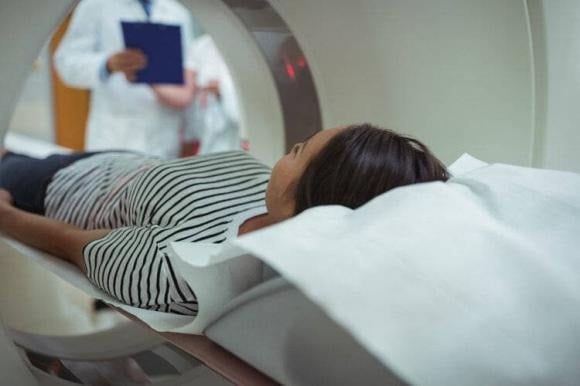Mrs. Ha, a 52-year-old woman, accidentally discovered a tumor the size of an egg in her lower right abdomen. Upon touching it, she felt a hard lump and, after researching online, assumed it was just a fatty tumor. However, her husband advised her not to trust information from the Internet and suggested she get it checked, especially since she had recently experienced loss of appetite and significant weight loss.
Mrs. Ha decided to go to the hospital for a check-up. After the examination, the doctor revealed that the lump in her lower right abdomen was not benign. Benign tumors usually have a soft texture, a smooth surface, distinct boundaries, and are easily movable. In contrast, Mrs. Ha’s tumor had a hard texture, an uneven surface, indistinct boundaries, and was difficult to move, all of which are signs of malignancy.
Further tests revealed that Mrs. Ha had colorectal cancer, with a malignant tumor developing in the ileocecal region of her intestine. The doctor emphasized that when cancer occurs, the body sends out warning signals. One should not be complacent and assume that the issue is not serious but instead seek medical attention and treatment as early as possible.
Many people believe that cancer will only manifest with obvious symptoms, but this is not always the case. Obvious symptoms typically appear when cancer is already in the middle or late stages. In the early stages, many patients do not exhibit characteristic symptoms. If your body presents any of the following five symptoms, it is highly likely to indicate a malignant tumor. Therefore, it is best to get a health check-up for these five parts annually to detect and treat any issues early on.
Abnormal Bowel Movements – A Sign of Colorectal Cancer
It is a common misconception that cancer will always cause pain. For instance, one of the most important warning signs of colorectal cancer is abnormal changes in stool.
These changes may include strange-shaped stools, hard stools, bleeding, or alterations in bowel habits, such as prolonged diarrhea or constipation. The best way to detect colorectal cancer is through a colonoscopy.

Persistent Cough Without an Obvious Cause – Warning Sign of Lung Cancer
A persistent cough, especially in smokers, could indicate lung cancer, making a CT scan of the lungs necessary.
If you experience a persistent, dry cough without an apparent cause, be vigilant about the possibility of lung cancer. In the early stages of lung cancer, there may not be symptoms like coughing up blood or difficulty breathing, but instead, a persistent dry cough can be the only irritating symptom.
Unfortunately, this symptom is often mistaken for throat or bronchial infections, causing people to delay medical attention and miss the opportunity for early detection of lung cancer.
Medical professionals advise that long-term smokers should undergo a chest CT scan, as it is the most effective method for early detection of lung cancer.
Indigestion – A Sign of Stomach Cancer
Feeling full, acid reflux, burping, hiccups after meals may lead to the assumption of indigestion, but it should not be taken lightly. Many stomach cancer patients in the early stages exhibit only one symptom: indigestion.
So, how can one be sure it is stomach cancer? The best way is to undergo an endoscopy.

Painless Lump in the Breast – A Sign of Breast Cancer
Breast cancer typically does not cause pain. Painless lumps are the most common symptom of breast cancer. Conversely, if you experience lobular hyperplasia in your breasts, you may feel abnormal swelling and pain during your menstrual cycle.
If you detect a hard lump with an uneven surface, it is advisable to consult a doctor and undergo an ultrasound or mammogram for further examination.
Unexplained Fatigue – A Sign of Liver Cancer
Symptoms of various cancers can be subtle and unclear. For instance, some patients with liver cancer exhibit only one symptom: unexplained fatigue. Fatigue can be attributed to poor diet or inadequate sleep, and very few people pay attention to this issue.
Especially for long-term alcohol addicts or those with hepatitis B or C, unusual fatigue could indicate liver cancer. The best way to detect liver cancer early is through a color doppler ultrasound and alpha-fetoprotein test.


































